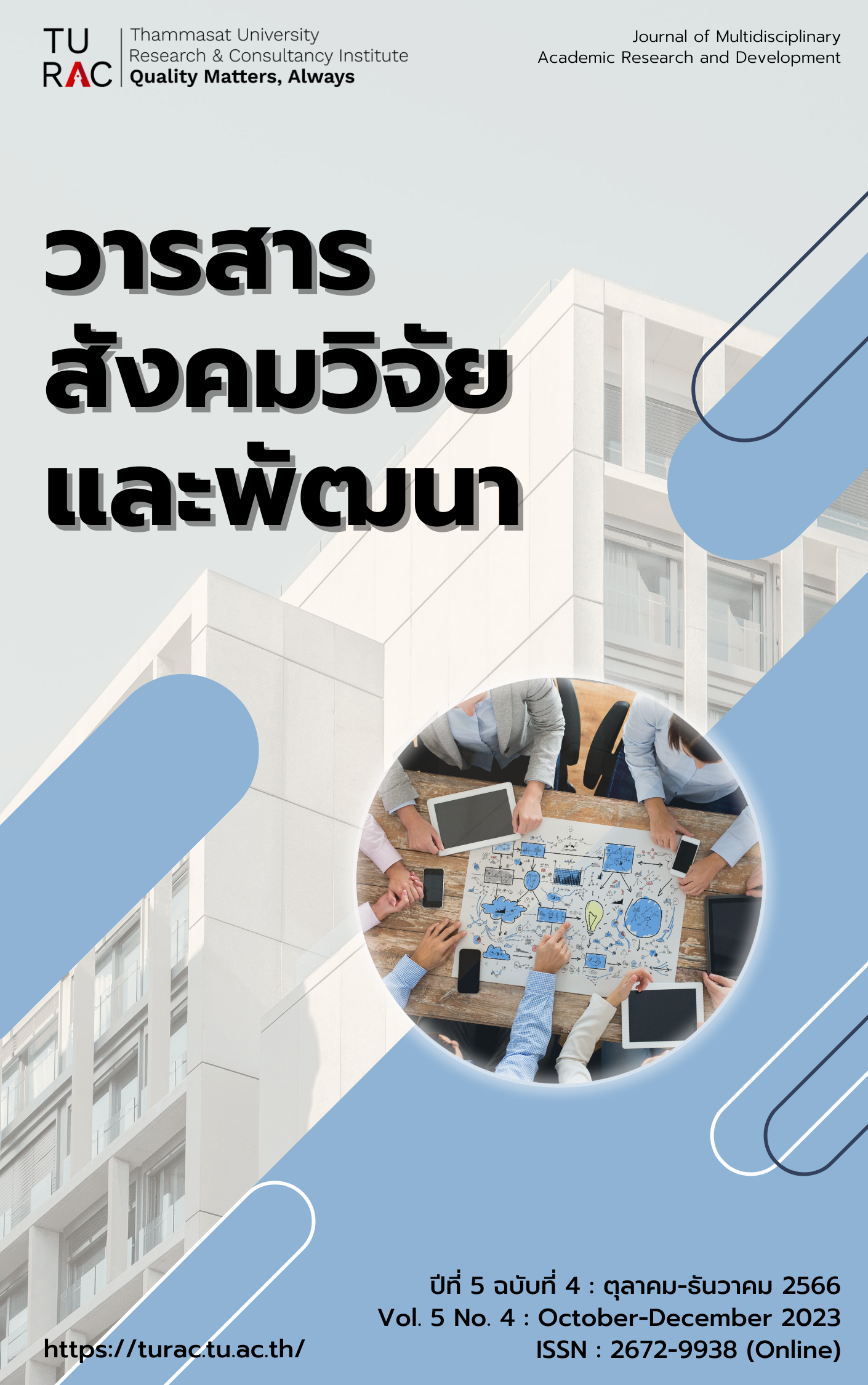The Relationship between Adaptive Leadership of School Administrators and Teamwork according to the Opinion of Teachers in Sueksa Songkhro Schools in Three Southern Border Provinces
Keywords:
Adaptive leadership, Teamwork, Opinion, Sueksa Songkhro SchoolsAbstract
This quantitative research aimed to study 1) the level of school administrators' adaptive leadership, 2) to study the level of teamwork and 3) the relationship between school administrators' adaptive leadership and teamwork according to the opinion of teachers in Sueksa Songkhro Schools in three southern border provinces. The sample used in the research were 144 teachers in the Sueksa Songkhro Schools under the Office of Special Education Administration in Thailand's three southern border provinces in the academic year 2022. The research tool was a five-Likert-scales questionnaire. The data were analyzed by percentage, mean, standard deviation, and Pearson's correlation coefficient. The research findings were as follows:
1) The overall level of school administrators' adaptive leadership according to the opinion of teachers in in Sueksa Songkhro Schools in Three Southern Border Provinces was at a high level. 2) The overall level teamwork in schools according to the opinion of teachers in in Sueksa Songkhro Schools in Three Southern Border Provinces was at a high level. 3) The relationship between the school administrators adaptive leadership and teamwork according to the opinion of teachers in Sueksa Songkhro Schools, Three Southern Border Provinces, overall, had a positive relationship at a high level (rx,Y = .814), at statistical significance level of .01.
References
กลุ่มส่งเสริมการจัดการศึกษาสำหรับผู้ด้อยโอกาส. (2564). แนวปฏิบัติการรับนักเรียนสำหรับโรงเรียนการศึกษาสงเคราะห์ ปีการศึกษา 2564 สำนักบริหารงานการศึกษาพิเศษ สำนักงานคณะกรรมการการศึกษาขั้นพื้นฐาน. เอกสารประกอบการรับนักเรียนสำหรับโรงเรียนการศึกษาสงเคราะห์ปีการศึกษา 2564.
ณฐาพัชร์ วรพงศ์พัชร์, พงษ์ศักดิ์ ผกามาศ, สุริยะ วชิรวงศ์ไพศาล, และจิรนันท์ ใหญ่ลำยอง. (2565). แนวทางการพัฒนาภาวะผู้นําแบบปรับตัวของผู้บริหารสถาบันการอาชีวศึกษามืออาชีพภายใต้สถานการณ์วิถีปกติใหม่และวิถีถัดไปในภาคตะวันออกของประเทศไทย. วารสารพุทธมัคค์ ศูนย์วิจัยธรรมศึกษา สํานักเรียนวัดอาวุธวิกสิตาราม. 7(1), 204-217.
ณพัฐอร เฮงสมบูรณ์. (2564). การทำงานเป็นทีมที่ส่งผลต่อประสิทธิภาพการบริหารงานของสถานศึกษา สังกัดสำนักงานเขตพื้นที่การศึกษามัธยมศึกษา เขต 6. (วิทยานิพนธ์ครุศาสตรมหาบัณฑิต, มหาวิทยาลัยราชภัฏราชนครินทร์).
ณัฐพร สายศร, วรรณวิศา สืบนุสรณ์ คล้ายจำแลง, และสุดารัตน์ สารสว่าง. (2563). ความสัมพันธ์ระหว่างภาวะผู้นำการปรับตัวของผู้บริหารสถานศึกษากับการเป็นโรงเรียนแห่ง การเรียนรู้ของโรงเรียนสังกัดกรุงเทพมหานคร. วารสารครุศาสตร์ปริทรรศน์. 7(2), 147-160.
ทิศนา แขมมณี. (2553). กลุ่มสัมพันธ์เพื่อการทำงานและการจัดการเรียนการสอน. กรุงเทพฯ: นิซิน แอดเวอร์ไทซิ่ง กรุ๊ป.
ธิดาพร แก้วสว่าง, และสมถวิล วิจิตรวรรณา. (2564). ความสัมพันธ์ระหว่างการรับรู้ความฉลาดทางอารมณ์ของผู้บริหารกับการบริหารงานด้านบุคคลของสถานศึกษา สังกัดสำนักงานเขตพื้นที่การศึกษาประถมศึกษานนทบุรี เขต 2. วารสารมนุษยศาสตร์และสังคมศาสตร์ มหาวิทยาลัย
ราชพฤกษ์. 7(3), 343-356.
ธีรศักดิ์ อุปรมัย อุปไมยอธิชัย และสุชาติ บางวิเศษ. (2563). การบริหารและการจัดการศึกษาสู่การพัฒนาที่ยั่งยืน. กรุงเทพฯ: บริษัท กู๊ดเฮด พริ้นท์ติ้ง แอนด์ แพคเกจจิ้ง กรุ๊ป จำกัด.
ปัญญา เลิศไกร, ศิริพร หมื่นหัสถ์, และลัญจกร นิลกาญจน์. (2560). การพัฒนาองค์การการเรียนรู้เชิงทฤษฎี. Development of theoretical learning organization. 9(1), 172-180.
ปิยรัตน์ ณ นคร และสุดาพร ทองสวัสดิ์. (2564). ความสัมพันธ์ระหว่างภาวะผู้นำของผู้บริหารสถานศึกษากับการทำงานเป็นทีมของครูในสถานศึกษา สังกัดสำนักงานการศึกษาเอกชนจังหวัดสตูล. วารสารการประชุมหาดใหญ่วิชาการระดับชาติและนานาชาติครั้งที่ 13. 1(1), 1676-1690.
พิมลพรรณ เพชรสมบัติ. (2564). ผู้บริหารกับการทำงานเป็นทีม. EDUCATION JOURNAL, Faculty of Education, Nakhon Sawan Rajabhat University. 4(1), 1-7.
ภัทราภรณ์ หลอดเหลา, วาโร เพ็งสวัสดิ์, และวันเพ็ญ นันทะศร. (2565). การพัฒนาตัวบ่งชี้ภาวะผู้นำทีมของผู้บริหารโรงเรียน สังกัดสำนักงานเขตพื้นที่การศึกษามัธยมศึกษาบึงกาฬ. Journal of Modern Learning Development. 7(11), 422-434.
รัชนี พจนา. (2561). ตัวบ่งชี้ภาวะผู้นำปรับเปลี่ยนสำหรับอาจารย์ในวิทยาลัยพยาบาลบรมราชชนนีสังกัดสถาบันพระบรมราชชนก: การพัฒนาและทดสอบโมเดลความสัมพันธ์เชิงโครงสร้าง. (ดุษฎีนิพนธ์ศึกษาศาสตรดุษฎีบัณฑิต, มหาวิทยาลัยมหามกุฏราชวิทยาลัย).
วราพร องคะลอย. (2564). การสร้างและการพัฒนาวัฒนธรรมองค์กรรัฐสมัยใหม่. วารสารหริภุญชัยปริทรรศน์. 5(1), 77-87.
วาสนา จักร์แก้ว เกศสุดา สิทธิสนั ติกุล และนิโรจน์ สินณรงค์. (2561). การเพิ่มโอกาสและการเข้าถึงการศึกษาระดับอุดมศึกษาของเด็กด้อยโอกาส ภาคเหนือตอนบน. Veridian E-Journal, Silpakorn University. 11(3), 1767–1785.
สุวัฒน์ จุลสุวรรณ์. (2563). ความสัมพันธ์ระหว่างภาวะผู้นําการปรับเปลี่ยนกับประสิทธิผลการบริหารสถานศึกษาสังกัดสํานักงานคณะกรรมการการศึกษาขั้นพื้นฐาน. วารสารวิชาการมหาวิทยาลัยการจัดการและเทคโนโลยีอีสเทิร์น. 17(2), 28-38.
อุทุมพร จันทร์สิงห์. (2561). ความสัมพันธ์ระหว่างภาวะผู้นำการเปลี่ยนแปลงของผู้บริหารสถานศึกษากับการทำงานเป็นทีมในโรงเรียน สังกัดสำนักงานเขตพื้นที่การศึกษาประถมศึกษาปทุมธานี เขต 2. (วิทยานิพนธ์ปริญญาครุศาสตรมหาบัณฑิต, มหาวิทยาลัยเทคโนโลยีราชมงคลธัญบุรี).
Blake, R., & Mouton, J. (1964). The Managerial Grid: The Key to Leadership Excellence. Houston, TX: Gulf Publishing Company.
Fullan, M. (2002). The change leader. Educational Leadership. 59(8), 16-21.
Goleman, D. (1998). Working with Emotional Intelligence. Bloomsbury Publishing, London.
Hallinger, P., & Heck, R. H. (1998). Exploring the principal's contribution to school effectiveness: 1980–1995. School Effectiveness and School Improvement. 9(2), 157-191.
Heifetz, R. A., & Laurie, D. L. (1997). The work of leadership. Harvard Business Review. 75(1), 124-134.
Heifetz, R. A., Grashow, A., Linsky, M. (2009). The practice of adaptive leadership: Tools and tactics for changing your organization and the world. Harvard Business School.
Heifetz, R., A. (2020). Adaptive Leadership Strategies: Leadership without easy answers. Cambridge: Belknap Press.
Hogan, T. J. (2008). The adaptive leadership maturity model. Organization Development Journal. 26(1), 55–61.
Jones, K. M. (2019). Learning analytics and higher education: a proposed model for establishing informed consent mechanisms to promote student privacy and autonomy. International Journal of Educational Technology in Higher Education. 16(1), 1-22.
Krejcie, R.V., & D.W., Morgan. (1970). Determining Sample Size for Research Activities, Educational and Psychological Measurement. 30(3), 607–610.
Oplatka, I. (2012). The 2011 BELMAS Conference: new topics, diverse ideas, much more international than before. Management in Education. 26(1), 21-27.
Robbins, S. (2001). Organization Behavior (9th ed). New Jersey: Prentice-Hall.
Romig, D. (1996). Breakthrough Teamwork: Out Standing Result Using Stractrued Teamwork. Chicago: Irwin.
Woodcock, M. (1989). Team development manual (2nd ed.). Worcester, Great Britain: Billing & Son.
Yukl, G., & Mahsud, R. (2010). Why flexible and adaptive leadership is essential. Consulting Psychology Journal : Practice and Research. 62(2), 81–93.
Downloads
Published
How to Cite
Issue
Section
License
Copyright (c) 2023 ยะห์มีน ดาฮารี, ชวลิต เกิดทิพย์

This work is licensed under a Creative Commons Attribution-NonCommercial-NoDerivatives 4.0 International License.



